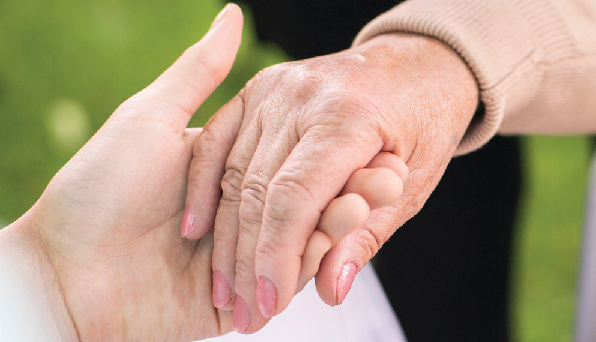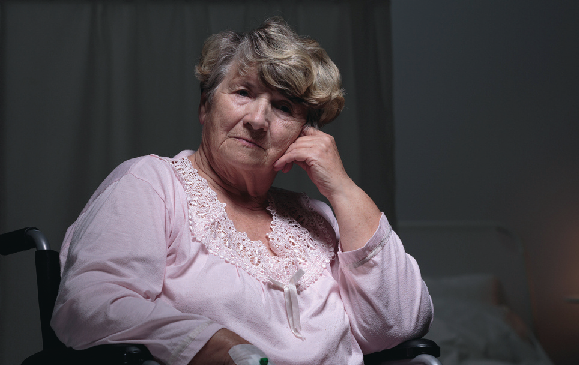Older people's health: Giving a helping hand
In Clinical
Follow this topic
Bookmark
Record learning outcomes
A BMA report has found that the UK’s ageing population is being failed by a fragmented and over-stretched health and social care system. Many of the problems highlighted are those that community pharmacy is actually very well-positioned to address.

Learning objectives
After reading this feature you should be able to:
- Appreciate the role pharmacy can play in helping to address gaps in health and social care provision for the elderly
- Recognise older customers at risk of mental health issues
- Known how to manage common minor health problems in older people.
Â
The UK’S health and social care system is failing older patients as it buckles under growing pressure from an ageing population with more complex needs, says a new report by the British Medical Association (BMA)1.
“Our society is ageing yet, too commonly, the health needs of older people can go unmet,†warns the report. “It is essential that we focus greater attention on supporting the process of growing older, and strive for a society in which everyone can look forward to a healthy later life.â€
Holes in the safety net
The BMA’s report, ‘Growing older in the UK’, comprises a series of six briefing papers covering key topics related to ageing and health, each written by an external expert in the field. According to the report, the health and life chances of older people are at risk of harm from gaps in the current provision of health, social and other welfare services. Reduced funding, increasing demand and inadequate resources all contribute to a negative impact on the health and well-being of older individuals in our community.
The key topics looked at by the report are:
- Social determinants of health in older people
- Health and social care services
- Mental health and well-being
- Living with long-term conditions
- The perception of ageing and age discrimination
- Supporting carers.
The final report recommended several important measures including:
- Action to tackle the social isolation of older people using ‘social prescribing’, a means of doctors referring patients to non-medical and community services (e.g. a council’s housing department)
- An effort to improve the diagnosis and undertreatment of older people with mental health problems
- Better identification and support of informal carers, the family and friends whose needs are often neglected
- An emphasis on valuing the ways older people can continue to contribute positively to society1,2 .
“The UK’s ageing population is being failed by a fragmented and over-stretched health and social care system,†concluded Professor Kumar, head of the BMA’s board of science and member of the report’s editorial board.
To help address these key unmet needs, Professor Kumar has urged the Government to support “greater co-ordination and integration of health and social care services and ensure that these services can cope with the growing needs of older patientsâ€.
Many of the problems highlighted in the BMA report are those that pharmacy is well-positioned to address. These include polypharmacy, a high treatment burden, anxiety and depression, and functional difficulties (e.g. incontinence and immobility).
Pharmacy support
Unsurprisingly, social isolation is strongly linked to loneliness among older people in the UK. The BMA’s report found that 10 per cent of people aged over 65 years experience constant or frequent feelings of loneliness. This social isolation and loneliness can have a significant impact on the quality of life and mental health of older adults which, according to the BMA, further underlines the importance of identifying and reducing barriers to older people’s participation in society.
Social isolation, when experienced in older age, also raises the risk of mortality, which makes it an important area for pharmacyled intervention. Studies have shown that the impact of reducing social isolation on survival among patients aged in their 60s was comparable to the benefits of giving up smoking and greater even than the effects of obesity and physical inactivity.
Pharmacy teams can play an important part in recognising older customers in their community who may be at risk of social isolation.
The three major life events most strongly associated with social isolation in the elderly are:
- Retirement and loss of connection with work colleagues
- Falling ill and becoming less mobile
- A spouse dying or going into care.
Levels of loneliness are also found to be higher among older adults from ethnic minorities living in the UK, particularly where language or communication barriers exist.
Age UK makes the important point that, although linked, social isolation and loneliness are not the same and each may require different interventions, particularly in older individuals3. For example, older people experiencing social isolation may need more practical, logistical support, such as help with transport, whereas lonely or depressed patients may want someone to talk to and will depend on more emotive aspects of care.
A key way that pharmacy can help to tackle social isolation among the elderly is by supporting patients in their independent living. Important tools to facilitate this include mobility and daily living aids, many of which are available via larger pharmacy outlets.
Examples include:
- Bathroom and toileting aids: grab rails, shower seats and stools, bath boards and seats, raised toilet seats and guards, non-slip bath and shower mats, and urinals and bed pans
- Walking aids: walking sticks, walking frames and rollators
- Kitchen and home aids: kettle tippers, multipurpose openers, easy-grip devices, specially adapted crockery, cutlery and tableware.
Monitored dosage systems are another useful resource that pharmacy can provide to help older patients (particularly those on polypharmacy) to keep track of their medications.
Pharmacy teams can further help older customers by signposting them to valuable sources of support such as charities working with the elderly; local groups and activities targeted at older individuals (e.g. friendship group meetings; University of the Third Age), and volunteering organisations. Community pharmacies can also help older people access important practical services, such as medication home delivery and NHS transportation providers.

Â
Managing common health problems in the elderly4,5
Joint pain
Steadily worsening joint pain in older people is typically a sign of osteoarthritis (OA), the effective management of which centres on three core principles:
- Lifestyle measures
- Analgesia
- Supportive therapies.
Exercise is an essential lifestyle prescription for any patient with OA as it strengthens joints, builds muscle and is proven to alleviate symptoms. Weight loss is also important in any individual with joint pain who is overweight or obese to help ease strain on the joints. OTC options for the relief of joint pain include paracetamol and NSAIDs such as ibuprofen and diclofenac.
Topical formulations of the latter may be particularly effective for treating joint pain and swelling in the knees or hands. When recommending any analgesic to an older patient, it is particularly important to consider potential contraindications, co-morbid conditions and concomitant medications. Supportive therapies that may be recommended to help with joint pain in the elderly include TENS machines, thermotherapy or assistive devices like splints, insoles or walking aids.
Haemorrhoids
A range of creams, lotions and suppositories available OTC for the treatment of haemorrhoids can be recommended to older customers for the short-term relief of symptoms such as pain, swelling, itchiness and general discomfort. However, customers should be cautioned not to apply topical OTC therapies for more than one week as prolonged use can lead to irritation of the sensitive skin surrounding the anus. It is also important to combine topical treatment with lifestyle changes that can stop haemorrhoids worsening and maximise the chance of spontaneous healing.
These include preventing constipation by eating a high-fibre diet, increasing fluid intake and trying to avoid straining when passing stools. Cases of very painful or persistent haemorrhoids, and any older patient who reports symptoms of anal bleeding, should be referred to their GP for further investigation.
Bladder weakness
Bladder weakness is a common problem among older adults that can cause significant embarrassment and impact negatively on selfesteem. Numerous pharmacy products and devices are available to tackle urinary incontinence, the most popular being absorbent pads and pull-ups (e.g. TENA).
These are embedded with a special hydrophobic layer that draws urine away from the surface of the pad and ensures the skin remains dry. Female customers should be advised to avoid using sanitary pads as these are less effective at locking away moisture and can lead to dampness and skin irritation. Similarly, tampons are not recommended for women with stress incontinence as a means of stopping leakage from the bladder neck.
Lifestyle advice for customers with bladder weakness should include staying hydrated (1.5-2 litres of fluid a day is recommended), eating a balanced diet, maintaining a healthy weight, stopping smoking and practising pelvic floor exercises. Pharmacists should also be aware of medications that can affect bladder function, particularly alpha adrenergic antagonists that can cause bladder leakage and diuretics that increase urine flow.
Dry eye
The likelihood of developing dry eye increases as a person ages, with an estimated one-third of those aged over 65 suffering from this problem. The cornerstone of OTC care is lubricant eye treatments, which include a range of drops, gels and ointments.
Also known as artificial tears, these products replace the natural fluid that is missing from the tear film. Preservative-free eye drops should be recommended for patients who need to apply eye drops more than six times a day, contact lens wearers or anyone with severe dry eye disease. Other treatment options include oily tear eye drops containing synthetic guar gums or liposomal sprays.
The latter is applied to the edges of the eyelid with the eyes closed and then spreads across the surface of the eye to create a new oily film. Eye ointments used overnight can help keep eyes moist and prevent tear evaporation but may also cause blurred vision and are not suitable for contact lens wearers. Regardless of the product recommended, it is important to remember that older customers may have difficulty applying eye drops and mechanical devices such as squeeze bottles and single-dose containers may be needed.
Excess earwax
Older people are at increased risk of earwax build-up as the ear’s natural wax becomes drier with age. OTC eardrops containing sodium bicarbonate, urea hydrogen peroxide, olive oil or almond oil can be recommended to help soften the earwax and allow it to fall out naturally.
These products are not suitable for anyone with a perforated eardrum or ear infection. If symptoms are particularly severe or fail to improve after three to five days of eardrop use, suggest the patient visits his/her GP, as hearing tests and/or ear irrigation may be required.
Dietary deficiencies
General healthy eating advice applies equally to older individuals as it does to the population as a whole. However, obesity is prevalent among the older population and it is important to remember that both basal metabolic rate and physical activity decreases with age, leading to a reduced daily calorific requirement.
The digestion, absorption and metabolism of nutrients also changes as the body ages. Evidence indicates that malnutrition is common among older adults, particularly those living in institutions, suggesting low intake of a range of important micronutrients.
The skin’s ability to synthesise vitamin D also diminishes with age, so a 10mcg supplement should be recommended for older people in line with latest guidance stating that everyone in the UK requires 10mcg of vitamin D a day. They should also be advised to increase their consumption of vitamin D-rich food sources.
Â
Tackling mental health issues
Mental health remains another important, but often overlooked, problem in the elderly population. The BMA’s report estimates that more than one in every five individuals aged over 65 years suffers from depression, yet 85 per cent of those affected said they receive no help from the NHS.
“We must tackle the under-diagnosis and under-treatment of mental health conditions in older adults, to make sure that their mental health is treated as importantly as their physical health,†says Professor Kumar.
“We know that only a small proportion of older people with depression seek treatment, with research suggesting that, although 20-40 per cent of older people in the community show signs of depression meriting treatment, only 4-8 per cent consult a GP.â€
The Royal Pharmaceutical Society has highlighted some useful ways in which pharmacists can help identify older patients who may be in need of help and support with mental health issues but are reluctant to ask6:
- Be vigilant for changes in mood or engagement in activities among customers. If an older patient show signs of persistent low mood and loss of interest in activities, talk to them further about this
- Ask the two key depression screening questions suggested by NICE and the British Association for Psychopharmacology:
- ‘During the past month, have you often been bothered by feeling down, depressed or hopeless?’
- ‘During the past month, have you often been bothered by little interest or pleasure in doing things?’ If the answer to either question is ‘yes’, encourage the person to visit his/her GP
- Look out for changes in personal circumstances, such as employment, divorce, bereavement, finances or a newly diagnosed or chronic medical condition, that could act as a trigger for the development of depression.
Reaching out to carers
 A carer is defined as any individual who provides unpaid care for a family member, partner or friend who cannot manage independently due to, for example, ill health, frailty, disability or mental health issues.
A carer is defined as any individual who provides unpaid care for a family member, partner or friend who cannot manage independently due to, for example, ill health, frailty, disability or mental health issues.
“In the UK today there are a staggering 6.5 million people providing a level of unpaid care to a relative, close friend or neighbour,†says Professor Kumar.
“Caring is something that most people do, but which they are not prepared or trained for, and which can have a devastating impact on carers’ lives in terms of work, health, income, family and other relationships. We must ensure there is a focus on carer-friendly health services, which support carers not only to look after their loved one, but to look after their own health and well-being as well.â€
Community pharmacy already provides a number of the key services that help to support and assist carers in the UK. These include practical help to order and collect prescriptions from GP practices, home delivery of medication, MDS services to help carers effectively manage the medication of the person in their charge, and signposting to support organisations specifically dedicated to helping carers in their day-to-day lives.
To further enhance this support it is vital that carers are identified and informed about the range of services available to access via their local pharmacy. To this end, the Pharmaceutical Services Negotiating Committee (PSNC) has developed two template leaflets to assist pharmacy contractors when advising carers on the services they offer and to provide carers with information on managing medicines.
These are available to access at: psnc.org.uk/services-commissioning/locallycommissioned-services/carerfriendlypharmacy.
Â
REFERENCES
- The British Medical Association. Growing older in the UK. 2016
- The British Medical Association. Welfare services fail to meet population’s needs. Press release 26 September 2016. Available at: bma.org.uk/news/2016/september/welfare-services-fail-to-meet-populations-needs
- Public Health England. Local action on health inequalities: reducing social isolation across the lifecourse. Practice resource: September 2015
- NHS Choices: nhs.uk/pages/home.aspx
- British Nutrition Foundation: nutrition.org.uk
- Royal Pharmaceutical Society. How can you encourage medicines optimisation for patients with depression? Article available at: rpharms.com/promoting-pharmacy-pdfs/mo-article---depression.pdf
Â
